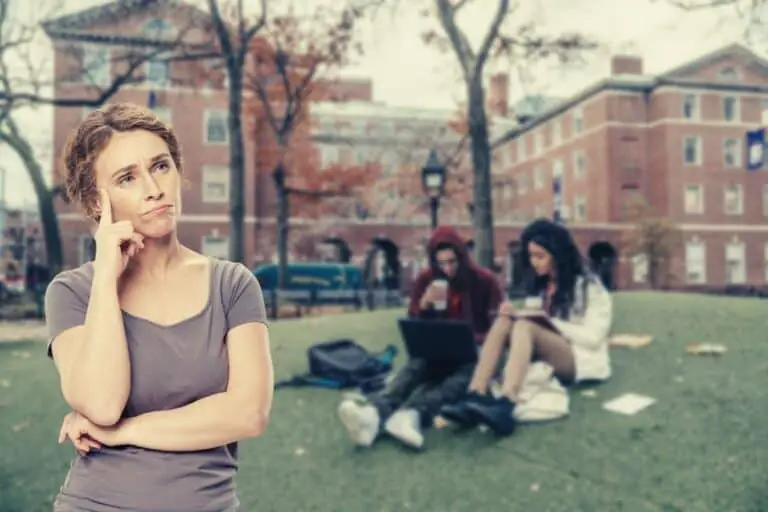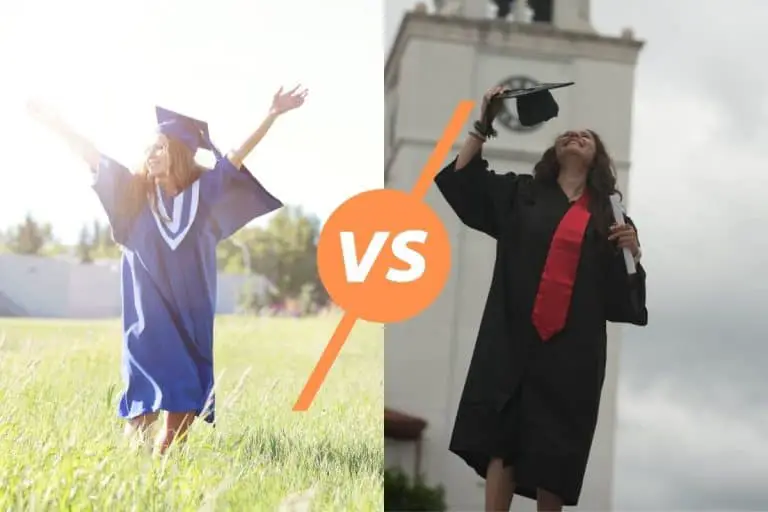Does College Have Prom? (Dances & Formals Demystified)
For some, prom is one of the highlights of high school. So if you enjoyed picking out your clothes and choosing who to invite, you want to do it again, right? But if colleges don’t have proms, how will you be able to do this?
Colleges don’t have school-wide proms, but organizations—especially fraternities and sororities—organize formals and semi-formals throughout the year. Unlike high school, these events aren’t chaperoned because colleges consider students adults responsible for their own welfare.
If you’re not sure what to expect from college, you’re not alone. By the time senior year rolls around, you know what to expect from school; unfortunately, even a campus visit brings up more questions than answers. Read on as we explore why colleges don’t have proms but what they have instead.
Why Don’t Colleges Have Proms?
The most obvious reason colleges don’t have proms is because college students don’t want to be associated with high school. Once high school students graduate, they want to be seen as adults. Adults wouldn’t want to go to a dance supervised by teachers and other adults.
Size is another reason that colleges and universities don’t hold proms. Although the average high school population is listed as 526, most schools are in the 1,000-2,000-student range. Even America’s largest schools have 3,000-5,000 students.
Although some colleges only have several thousand students, most are medium-sized, between 5,000 and 15,000 students, or large, which is anything over that. Imagine trying to hold a prom for 10,000 students.
Imagine the expenses that would be required to host an event for that many people. Decorations, food, the venue, the band—those would add up quickly, especially at a more prominent university.
Finally, there’s the issue of liability. If something goes wrong at an event sponsored by the college or university, it could be held liable. But if something happens at a fraternity or sorority, those groups are responsible. The university can then ask the group to change its policies or risk being kicked off-campus.
Luckily, colleges and universities have alternative events. But if colleges don’t have proms, why do high schools have them?
Why Do High Schools Have Proms?
Ironically, high schools have proms because colleges used to have them. Starting in the mid-1800s, some colleges and universities hosted formal dances. Students attending these events promenaded—or displayed—that they knew how to dance and act in proper society.

During that time, colleges could host these dances because the student population was much smaller. Also, they didn’t come with a hefty price tag—besides some decorations and food, the entertainment expense would have been several musicians to play dance tunes. And yes, just like at high school proms today, adults chaperoned them.
As colleges became larger, they outgrew the proms and formal dances. However, middle-class Americans who wanted to send their kids began to push for similar social dances. These events were modeled after the college events.
At first, high school students wore their Sunday best and attended an informal dance. Then, the dances became more elaborate events, and by the 1950s, some had grown so large that they could no longer be held in a high school’s gym.
Proms continue to be huge affairs, costing the average family over $1,000. And as much as they enjoyed the prom experience, once they go off to college, they want to leave high school behind them.
What Kind of College Events Are Similar to Proms?
College has some events similar to a prom, but even social events with a similar name are quite different. Three of these events include homecoming, spring break, and celebrations after games.
Homecoming
Since schools have their own traditions, homecoming won’t look the same in all high schools. For example, some high schools let alumni return to the campus to meet old teachers and see friends with whom they have lost touch.
- Some schools will have a parade.
- Others will play one of their biggest rivals.
- If a school has a Homecoming King and Queen, they’ll be crowned then.
- A homecoming dance is usually the main event.
The homecoming dance isn’t the prom, but a warm-up to it or a dress rehearsal, except you don’t have to dress up. Since homecoming is early in the academic year, the dance is a fall event. If you already attended a homecoming dance, expect the outfits to be fancier and more formal.
Also, unlike a prom, at most schools, anyone who attends the school can go to this dance.
College Homecoming
A college homecoming is totally different. There are some similarities:
- It happens early in the year.
- Alumni return to their school.
- A sports event (usually football) is the main event.
- Some schools will have a parade.
But homecoming week at a college or university will include many different types of events, and those events vary from college to college. Not only will there be officially sponsored events, sororities, fraternities, and college clubs can add additional events.
For example, North Carolina Central University, an NBHC University, will include these events in their homecoming week:
- A worship service
- Soul food dinner
- A walk to celebrate the university’s partnership with Habitat for Humanity
- An event to honor those who mentor students at nearby elementary schools
- A tent party
- A formal reception
- Two class reunion dinners
- A hip-hop and R&B concert, followed by a dance
Larger schools like the University of Michigan often have both university-wide and individual department (often known as schools) celebrations.
The university sponsors reunion events, such as lunches, art tours, faculty meet and greets, and milestone celebrations. Tailgate parties, both formal and informal, happen before the big homecoming game.
However, individual schools have homecoming events as well:
- The School of Engineering sponsors a lunch for current and former engineering students and professors.
- The School of Pharmacy hosts a tailgate party.
- The School of Music, Theatre, and Dance will host an awards ceremony followed by a reception.
These are some of the official events and don’t include the parade, the game itself, and the after-parties.
And that leads to one of the most significant differences between high school and college homecoming—the students are doing their own thing, without adults chaperoning.
As a result, it will seem like there are parties everywhere—in dorms, sororities and fraternities, bars, and restaurants.
However, there’s one other difference worth mentioning. In high school, everyone either loves homecoming or pretends to like it. There’s a lot of peer pressure to attend and participate. If you don’t want to, people will want an explanation.
In college, because there are so many activities, there’s less public pressure. Of course, you’ll still have your friends wanting you to go to this or that party, but it’s between you and them, not between you and your friends and the rest of the school. And if you don’t want to participate, you can always fall back on “Sorry, I have to study.”
Formals
Some fraternities and sororities—also known as Greek organizations because they go by Greek letters—have formals, which are prom-like events. Often the sororities’ events are more formal than the fraternities’, although neither is like a high school prom. College students are on a budget, and besides, who wants to get that dressed up?
Expect the formals to have a different theme every year. Also, don’t be surprised if a sorority decides the formal should be held at out-of-town settings—sort of like a mini-vacation.
Sometimes a sorority will join with a fraternity to plan either the formal or a social. These can also have a theme.
Many fraternities host two formals—one in the winter and the other in spring. The winter event will be more formal, while the spring formals tend to be crazier, with multiple parties happening simultaneously. Usually one night is devoted to partying while the next has a formal dance followed by more partying.
Fraternity formals can also be out-of-town settings. These events can get pricey quickly—hotels, travel costs—frats often rent busses–, and dining out can’t all come out of the house budget.
Dress at fraternity formals is even less formal than the sorority formals. Frat brothers might pick a theme that doesn’t require formal tuxedos. Who goes to a luau in a tie and suit?
Traditions and types of formals can vary greatly, so this is more of an overview. If you plan to join a fraternity or sorority, you’ll get info specific to that organization from them.
College Dances
When you graduate, say goodbye to high school dances. Depending on your experience, this may be a relief. But it won’t be a disappointment. Most colleges don’t organize school-wide dances for the same reasons they don’t host formal proms. However, that doesn’t mean you won’t have opportunities to dance.
What Are College Dances Like?
College dances aren’t like high school dances in many ways. There are no permission slips to return, no expectation of when the dance is over, no rules like you can’t return if you leave, and no chaperones.
Therefore, the kind of behavior that chaperones want to prevent happens at these dances. There will be music, but it won’t be PG. There will be dancing, but no one telling you what is and isn’t appropriate. There will most likely be alcohol.
As an adult, you’re free to make your choices. But you’re also responsible for any negative consequences.
We’ve already mentioned sorority and fraternity formals. Most of the Greek organizations also host semi-formals and dances. You don’t have to be a member of a fraternity or sorority to attend—you just have to get invited.
Colleges typically have venues that host bands, deejays, and other entertainers on campus. Departments and clubs also hold dances and social events, so you’ll have plenty to keep you entertained. You can have so much fun that one day, “I have to study” becomes “I really, really have to study.”
Game Events
Although sports are important in both high school and college, games at universities are filled with more activities and choices of which activities to attend. If you don’t want to tailgate with other friends, you don’t have to do so. But most medium or larger colleges don’t have a tailgating party but parties.
A school’s tailgating traditions can be based on the location. For example, since the University of Washington is located next to a large lake, tailgaters pull up to nearby docks for their parties. An article in Bleacher Report has pictures of the top 25 tailgating schools (source).
Universities might have pregame entertainment, team-send offs, opening ceremonies, halftime shows, and after-game celebrations. And don’t forget off-campus celebrations, which can get quite rowdy.
Can You Relive Your Prom?
You can relive the prom experience, but don’t expect it to be the same. You won’t have the shared memories of the prom-goers. But you’ll be treated like a special guest. Maybe you won’t get the movie star treatment, but your date’s friends will be impressed (and perhaps a little envious).
Also, it won’t have that special feeling of this being the finale of your senior year.
Hold on, some might say—graduation is the finale.
The graduation ceremony is indeed the actual final event of high school. But which one did you really look forward to the most? The ceremony where you got to throw the mortarboard into the air, or the event that you planned for, dressed up for, and where you got to party with your high school friends?
High schools have different policies regarding who can attend a prom and what they must do. Typically, those 21 and older aren’t allowed to attend. In addition, schools will require the student and visitor to complete a permission slip (sound familiar?).
The form will ask for the name of the visitor and then list the rules or expectations that the guest needs to follow, such as
- Photo IDs and the completed form are needed for admittance.
- Guests must follow all high school rules, including the dress code.
- Guests can’t arrive without the host student.
- Students can’t return once they leave.
- Alcohol and tobacco will not be tolerated.
In most cases, if you receive an invitation to attend a high school prom, you’ll be able to do so. Think of it as a redo if your previous experience wasn’t positive or a chance to relive the excitement.
Source: East Tennessee State University: Prom Guest Permission Form
Source: The Odyssey Online: 5 Things That Happen When You Go To Prom While in College
Bottom Line
Prom is a special, once or twice in a lifetime experience associated with high school. University students consider themselves adults, so even if a college held a prom, few students would attend.
Instead, you will find plenty of social events, formal and informal, and they’ll be organized by other students, without adult supervision.







